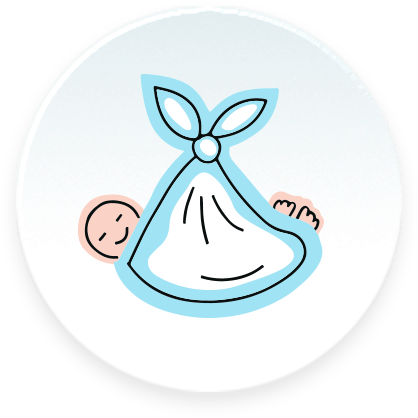Heidi, Jo and Imogen
Heidi and her family are participating from Perth, WA

We managed to catch Heidi during one of 3 month old, Imogen’s, unusually long naps. Heidi explained that Imogen was mainly cat napping at the moment rather than having solid day time sleeps. If any of you have heard of the ‘wonder weeks’, Imogen is on day 9 of a 14 day ‘leap’. She is waking easily, getting over tired and a bit irritable. So now Heidi and her partner, Jo, are trying anything and everything that works to get Imogen to sleep. At the moment, it’s letting her fall asleep on Heidi then tip toeing to the cot to put her to sleep; but a floor-board would creak or the baby would feel the change to the cot and wake up. Given that Imogen had slept for the entire 45 minute phone conversation with Heidi, we now have to promise to call her every nap time!
Heidi and her family
This is Heidi’s first baby. Imogen came into the world on Christmas Day 5 ½ weeks premature; a Christmas baby. Of course, the couple were delighted at her safe arrival, but slightly disappointed it had to be Christmas Day as it is really big in Heidi’s family. Heidi is slightly concerned Imogen’s birthday will just get lost among future festive celebrations. She recalls that Imogen arrived with the help of some forceps looking all gooey and jaundiced, but it was love at first sight. A sense of overwhelming love just rushed in. “I just loved her”. Heidi describes how exhausting early motherhood is, all the sleep deprivation, “and then she just smiles” and everything is completely OK.

Heidi feels lucky to have a very supportive family. Her mum offers help every week and one of her sisters lives close by and has a three year old daughter. Her South African partner, Jo, is incredibly supportive. She even helps with settling and feeding in the night despite having to get up in the morning to work during the day. Heidi and Jo make a wonderful team and loving family for Imogen.
Heidi’s connection to type 1 diabetes
Heidi was diagnosed with type 1 diabetes when she was 9 years old. She is now 36 years old, so that makes 25 years of living with type 1. But rather than dwell on this, Heidi works as a social worker with the same dedicated treating team that cared for her as a child. So Heidi lives and works with diabetes 24/7 and loves her job.
She also has a sister who has type 1 diabetes. The two are great support for one another.
It is in the back of her mind that Imogen has a slightly higher risk than another child whose parents don’t have type 1 diabetes. Heidi and Jo attended a geneticist prior to conception and made an informed decision about the risks based on probabilities. As Jo was older, the probabilities of having a child with chromosomal abnormalities were equivalent, so “we stuck with the devil we knew” and Heidi carried the baby.
Why Heidi said “yes” to ENDIA
Because Heidi works in the field, knows and trusts the hospital clinicians and ENDIA nurses, Alison and Alex, it was an easy decision to make. Heidi signed up in her 1st trimester. “The ENDIA staff are flexible, reassuring and offer that continuity of follow-up which is so important to many parents.”
Heidi has been involved in a number of diabetes related research projects in the past, and is keen to find out as much as possible about the condition.
She remembers being diagnosed and all the myths around what triggered type 1. Her mother was told that chickens from farms injected with hormones and potato skins were the likely cause. Heidi’s mother lived with a lot of guilt with information from staff that “because she didn’t peel her potatoes, she’d caused her daughter’s type 1! Poor mum.”
The couple find it reassuring to receive the results of Imogen’s antibody tests. Heidi admits that the first blood draw for Imogen was hard, but it’s necessary to get the “peace of mind” from the results. “The ENDIA staff are so flexible and have a take what they can get approach, which is a great ethos. You don’t feel any pressure and you’re not forced to do anything.”
The thing about type 1 diabetes is…
Although Heidi has lived with type 1 for 25 years, during pregnancy, the management of her diabetes was “just constant; a full time job”. She had a wonderful team of clinicians supporting her including an obstetrician for Imogen, an obstetric physician for herself, and a specialist diabetes and pregnancy Clinical Diabetes Educator. However, once Imogen arrived safely, the team left but the hormones continue to cause havoc during breastfeeding with Heidi’s type 1. The breastfeeding journey with type 1 is harder than pregnancy because that postnatal support is much less. “To prevent hypos I’ve been advised to test before feeds, during feeds and after feeds, and if you consider I feed Imogen 8 times in 24 hours, that’s a lot of finger pricks! But then she smiles at you with her Elvis smile, and that just doesn’t matter. She’s hilarious, her hair is just nuts, and she’s a very special little girl. It’s all worthwhile.”



